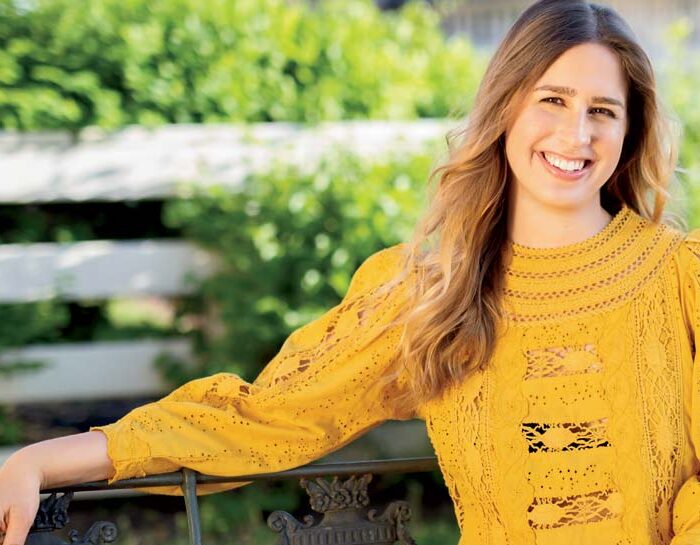Summer Harvest
By Ann Marie Scheidler
By Ann Marie Scheidler


When Laura Calvert was growing up in a small farm community in Central Illinois, she never imagined she would have a career in agriculture. “I literally had a cornfield in my backyard,” Calvert says. “But sometimes it takes moving away to realize what you are called to do.”
Lake Forest’s Elawa Farm Foundation announced in January that Calvert was their new executive director. She succeeded Joanne Miller who had been with Elawa since 2008. She comes to Elawa Farm Foundation from Advocates for Urban Agriculture (AUA), where she served as executive director for three years. There, she led the organization through significant growth and innovative program development during her tenure. Before AUA, Calvert worked for the Chicago Botanic Garden for eight years. There, she managed business operations for Windy City Harvest, the Garden’s urban agricultural workforce development program. She oversaw the business development of more than 13 urban farms and trained hundreds of youth and adult participants.
Calvert appreciates that she’s joining Elawa at an unusual time in history.
“We were just starting to unfold some plans for spring when everything closed down because of the pandemic,” she shares. “But at the end of the day, what we do at Elawa deemed us as essential. We have such a great team here that is so adaptable, we’ve been able to keep moving forward. It’s been incredibly grounding to be at Elawa now, to be able to get my hands in the dirt, and to know that we’re making a difference.”

In quiet moments, not that there are many these days, Calvert wonders how the pandemic will shape the community’s relationship with Elawa. “People are wanting locally grown foods,” she says. “There has been such a renewed interest in people gardening from home. We’ve had the highest number of orders from our virtual market—our seedlings sold out.” Because Elawa was unable to open its Garden Market in the spring, they went online. Each week, people had the opportunity to order produce and products from the farm as well as other locally sourced producers where they could pick up curbside later in the week.

“It’s so important to me that Elawa Farm continues to be a good neighbor to the greater county area,” she explains. “Local farmers have really stepped up and met the need of providing food to those who need it. We want to do whatever we can to keep these connections strong.”
Calvert says that going forward, Elawa Farm plans to leverage its production to improve healthy food access to its neighbors. “This will go beyond just what we produce. There will also be an educational component to the culinary programs we offer that will be more public facing and more real time. If we happen to have chives from the garden, we’ll have some recipes ready to go to show you what you can do with them. The silver lining in all of this shutdown time is that there is a real interest in what’s happening on our farm.”
This summer, Calvert hopes that the community will participate in one of its many on-site workshops, camps, or even a yoga class. Additionally, Elawa Farm will be offering a free, 45-minute tour of its beautifully restored farm and garden every last Saturday of the month through September, beginning at 11 a.m.
The Elawa Farm Group was built in 1917 for A. Watson Armour, a member of one of Chicago’s oldest and most distinguished families, and is considered architecturally significant as a rare example of a Lake Forest gentleman’s farm. It is also noteworthy for its fine design and for its association with two very significant architects: David Adler and Alfred Hopkins. The farm’s name Elawa comes from a composite of two of its previous owners Elsa and A. Watson Armour and Lelia and Wallace Carroll, who purchased the property in 1954. The buildings forming the main farm group have been restored and adapted for today’s use to preserve Elawa Farm as a stunning example of estate farm architecture and a unique gem of Lake Forest.

Elawa Farm is a public-private partnership dedicated to the preservation and stewardship of a unique combination of natural setting, designed landscapes, and buildings of architectural and historic significance. In 1998, the City of Lake Forest acquired a 16-acre parcel of land, including the original farm buildings. This purchase created an opportunity for a unique partnership of public and private organizations to collaborate in the preservation and use of this property.

“I’m so honored to join the Elawa Farm community and lead the organization in its next chapter, alongside its dedicated board of directors and staff. Elawa is a truly unique and beautiful place. There is nothing else like this in the Midwest and I look forward to expanding its programs and presence in Lake Forest and beyond.”
To learn more, visit elawafarm.org. Vintage wooden bowl seen in above image available through ThePolohouse shop on Etsy; a Lake Forest based online shop. Wardrobe from Valentina, Winnetka, 847-446-5480.
Sign Up for the JWC Media Email